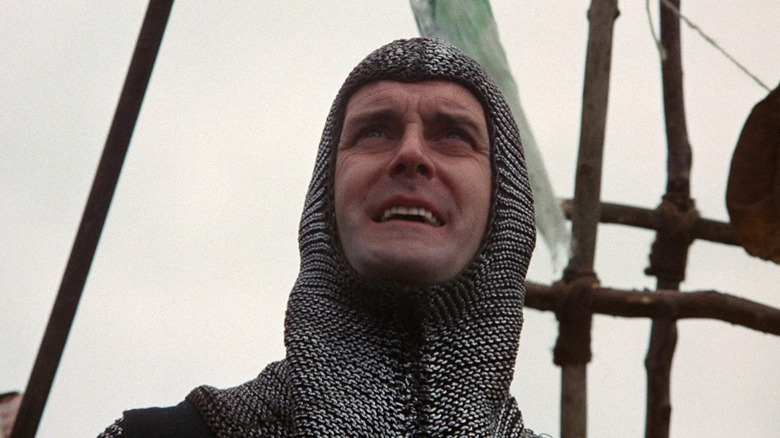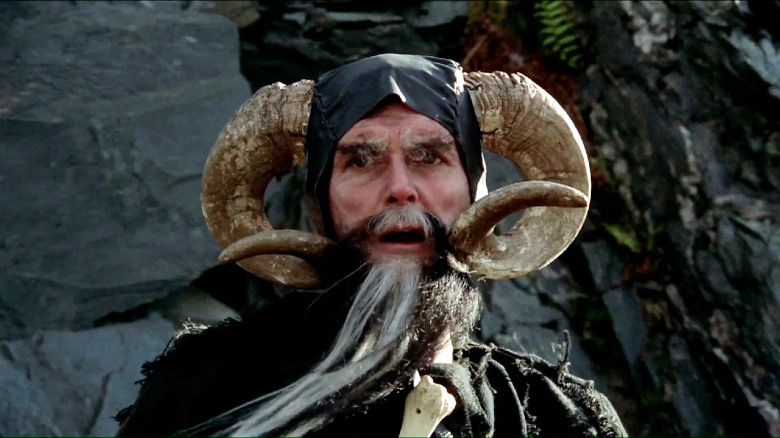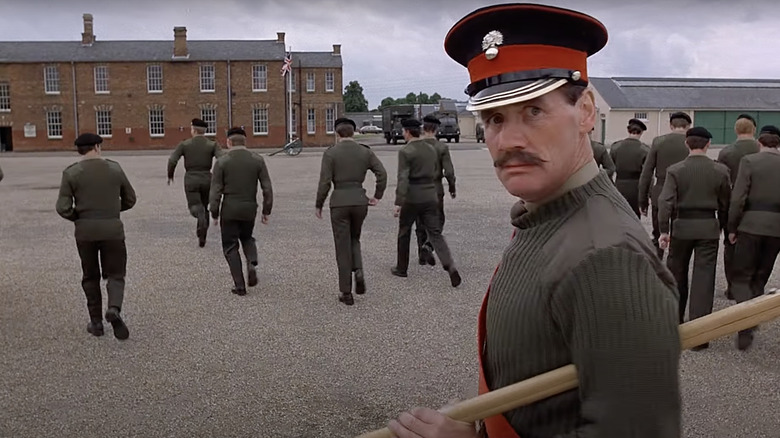John Cleese Sees A Major Limitation To The Art Of Improv Comedy
Even if comedy doesn't always get the respect it deserves, it's one of the most important pillars of entertainment. Sure, there's something to be said about how compelling a subtle film can be, or how fiercely defensive we can be of our favorite "serious" classics (just look at any Sight and Sound-related Twitter thread right now). But amid the constant stresses of life, comedy is practically a gift. It rarely demands the same emotional toll from its viewers; even when there's a deeper meaning layered underneath, it's usually happy to just evoke a simple laugh.
Whether you're watching an improv show, a series of sketches, or a good ol' fashioned rom-com, the jokes are a light-hearted escape from reality. Yes, they might poke fun at real-world issues, but the simple act of being happy briefly melts away frustrations.
That being said, comedy can also be a difficult category to pin down. It seems pretty fair to call it an entertainment genre (after all, there are an endless stream of comedic movies, books, shows, and more), but when you start factoring in the existence of stand-up comedy (and the fact that genres like drama or romance don't really have their own equivalents), the comparison starts to break down a bit. Still, one thing is abundantly clear: comedy can take on a lot of different forms. Some comedic works might be closely linked to a traditional story arc while others might just be a string of independent funny moments, but they've all still got a humorous thread running underneath.
Unfortunately, however, "Monty Python" co-founder John Cleese doesn't agree that all comedy formats are made equal. The writer has previously shared his thoughts on improv — and while he wasn't necessarily disparaging, he wasn't encouraging, either.
'The delights of improv have always rather escaped me'
In a 2014 interview with Harvard Business Review, John Cleese was asked to comment on improv comedy's rise in popularity. The actor and writer had the following blunt response:
"The delights of improv have always rather escaped me. I don't know why it's considered a major art form. I don't mean that it's not interesting or skillful. But over the years all the comedians that I've respected — I could also say all the comic writers — are people who put words down on paper and went on working on them until they felt they couldn't improve them anymore. That seems to me the most important and interesting part of comedy. The other is sort of a party trick, which I respect, but it doesn't seem to me that it should be regarded at the same level. ... [Improv doesn't] really build to any kind of dramatic climax or comedic climax."
Cleese has spent an awful lot of time working on carefully crafted comedy scripts, so it makes sense that he's committed to the format. After all, "Monty Python" drafts were written in pairs, then painstakingly workshopped by the rest of the troupe — you don't spend that much time on a single script unless you're confident that the process is worthwhile. And in all fairness, their hard work did pay off. The group's sketches have remained surprisingly popular over the decades. But being so sure of his own process may have caused Cleese to undervalue other comedians' work.
A fair assessment, or just a flippant dismissal?
In all fairness, John Cleese is right in saying that improv is less prone to including narrative or comedic arcs than its scripted counterparts are. That isn't to say that an improvised set can't have a satisfying arc (hats off to any improv comedian who pulls one off), but thanks to the nature of the format, it's just less likely to happen.
At the same time, it isn't exactly fair to write off improv solely because it doesn't stick to a predefined structure. Individual jokes have to rely on humorous stories (if you can think of a joke without any sense of story, please send it my way), but there's no hard and fast rule that every single joke has to relate to each other, or that they should all fit into some sort of narrative arc. Even scripted comedies stray from the arcs at times — stand-up shows are generally scripted, but don't always build to some big finish.
Now, one of the things that separates comedy from a lot of other "serious" genres is its willingness to stray from narrative arcs, so I'm tempted to give Cleese the benefit of the doubt here — maybe he's trying to separate scripted comedy from improv so the former gets a little more respect. Still, reducing improv to a respectable "party trick" is not a fair way to treat a major part of the genre. When it comes to defining a category, there are times when it makes sense to be exclusionary (yes, Marvel movies are a lot of fun; no, that doesn't make them shining examples of cinema's subtle possibility or emotional nuance). But comedy aims to make people feel good. Let's not lose sight of its humble roots in a search for prestige.


